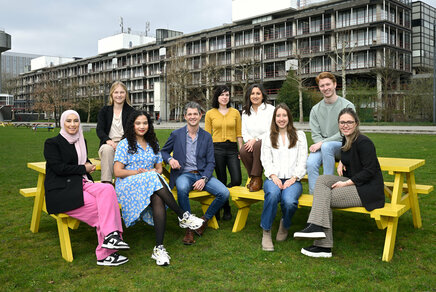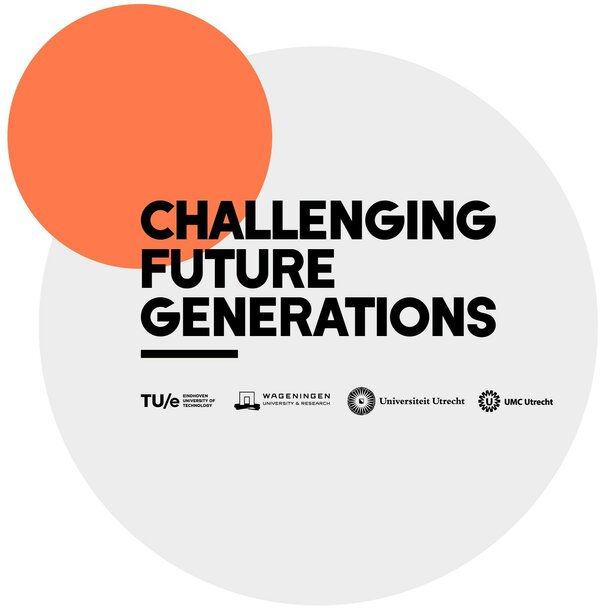Within CUCo, research may fail, as long as it is unusual and educational
Researchers from TU/e, Wageningen University & Research, Utrecht University and UMC Utrecht come together within the Centre for Unusual Collaborations to seek answers to societal issues from uncommon perspectives.
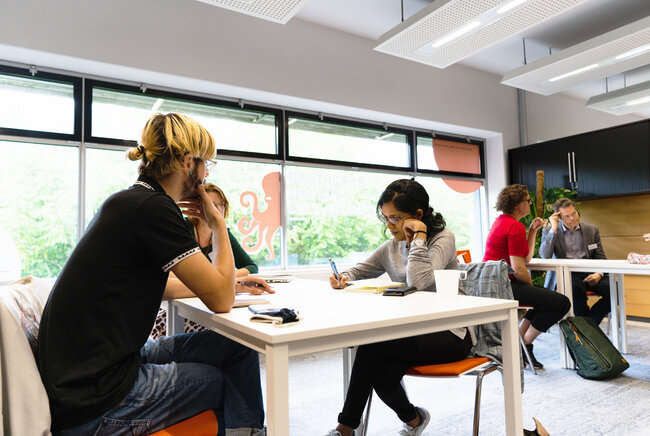
Research is always exceptional, but not always unusual. That is precisely why that extra dimension is sought within CUCo (Centre for Unusual Collaborations), where - as the name suggests - unusual research collaboration takes center stage. Learning from each other is the core and the interdisciplinary process leads. Groundbreaking results are therefore not the primary goal, competition loses to cooperation, and failure is absolutely allowed, because that is an important way to learn. No fewer than 22 TU/e researchers are involved in CUCo, including Yali Tang and Yoeri van de Burgt from the department of Mechanical Engineering.
"Unusual is really the key word: unusual collaboration, which also means unusual research and unusual results," summarizes Tang. "Exactly therein also lies the attraction. Working with people you wouldn't think of yourself, who have a totally different approach and methodology." At the start, six teams within the strategic alliance of TU/e, Wageningen University & Research (WUR), University of Utrecht (UU), and University Medical Center (UMC) Utrecht received a Unusual Collaborations Grant of up to 180.000 euros for one year. Two months later, six projects covering a wide range of topics were given the go-ahead.
- The power of one
- Structures of strength
- Playing with the trouble
- Defeating chronic pain
- The fair battery challenge
- All in the same boat: unusual solutions for cleaner water
Tang is involved in two projects: ‘The fair battery challenge’ and ‘All in the same boat’, where she’ll apply her expertise on the fundamentals of multiphase flows via computational fluid dynamics modeling. "My research looks at how matter transports, something that is essential when developing a battery or technology to produce clean water. In a battery, everything has to flow, so by better understanding and predicting that internal mechanism, we can come up with more efficient and less expensive batteries. In terms of clean water, I am working on a numerical model to map the transport of contaminated particles in water. That's why I'm a good fit for these studies. What’s more, it also gives me the opportunity to create concrete social impact."
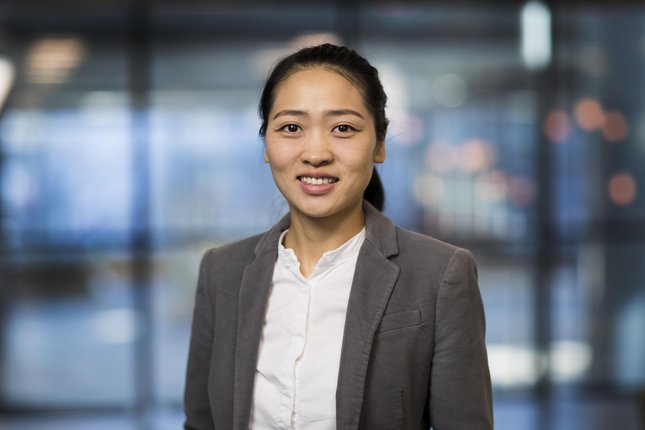
Making a real difference with innovation
That societal impact is also where the power of unusual collaboration lies, Tang says. "To make a real difference in innovation, you need diverse expertise and input from society. Normally, I work with companies and engineers, but in the CUCo projects different disciplines are involved, such as a lawyer who knows about laws and decision-making processes. Or social scientists who investigate which countries need fair batteries or clean water, and what materials are available there to produce them. That's important to ensure that what we develop is accessible to local residents."
Another important point that Tang emphasizes is the perspective CUCo offers researchers. "For someone like me, who does basic research, it can be difficult to get funding. Through CUCo, we get opportunities to develop within other research topics. In this way, we connect our research with practice. In addition, it is a good opportunity for young researchers in particular to expand their network."
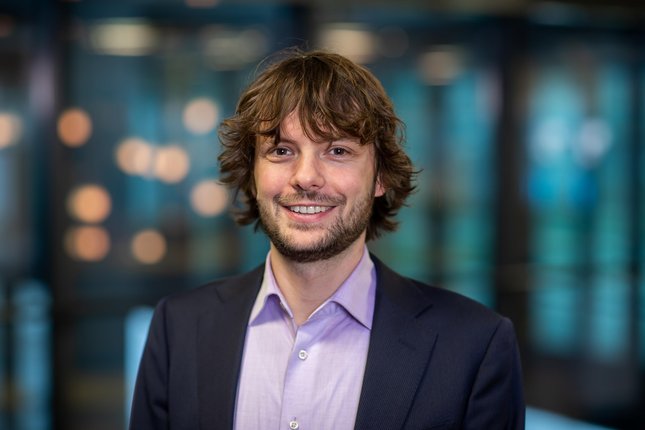
A linguistic perspective on chronic pain
TU/e department member Yoeri van de Burgt calls CUCo primarily ‘a plea for learning to talk and listen to each other’. His CUCo research looks at the topic of chronic pain. "A subject that many people struggle with, but in spite of that little is done with it,” he notes.
From his background as a materials scientist, Van de Burgt is interested in whether and how you can measure chronic pain. To this end, together with, among others, animal scientists, pain specialists, and behavioral and language experts, he is focusing on making ‘a type of biosensor’. "But the primary goal of this project is to learn how to understand each other so that we can together formulate a clear definition of the problem. In other words, we want to determine a linguistic view of chronic pain."
This approach has already led to a number of eye-opening findings. "There are so many different disciplines, and so many different ways of defining and speaking about the topic. Moreover, there are different types of chronic pain, for example psychological, but also rheumatism or other forms with an identifiable physical cause. Or nerve related, but with an unknown cause,” says van de Burgt
Van de Burgt emphasizes that for such a broad area of research, there is no one-size-fits-all solution. "Hence, this means that we need to investigate this problem using an interdisciplinary approach. The dialogue that results from this is very valuable, because you realize that nothing is self-evident. You are inclined to do so, coming from your expertise and reasoning. But what is self-evident to me may be totally unknown to another scientist."
I think it's very good to look through other people's eyes at the big problems from time to time
CUCo researcher Yoeri van de Burgt
The nature of CUCo projects is therefore to engage in dialogue, and not necessarily to arrive at concrete solutions straight away. Van de Burgt: "That does take a lot of time and also feels contradictive to the results-oriented nature of a scientist. Normally, you start with a question to which you seek an answer, from a bottom-up approach. Within CUCo, you actually do research from scratch, top-down with 'forced' collaboration as the main angle. ‘Can we do something fun together', that idea. This is very different from what we are all used to in our respective research fields, which therefore also produces very different output. In any case, it leads to more understanding and attention to the subject. In terms of chronic pain, that also provides more understanding towards patients and more specific solutions. I think it's very good to look through other people's eyes at the big problems from time to time."
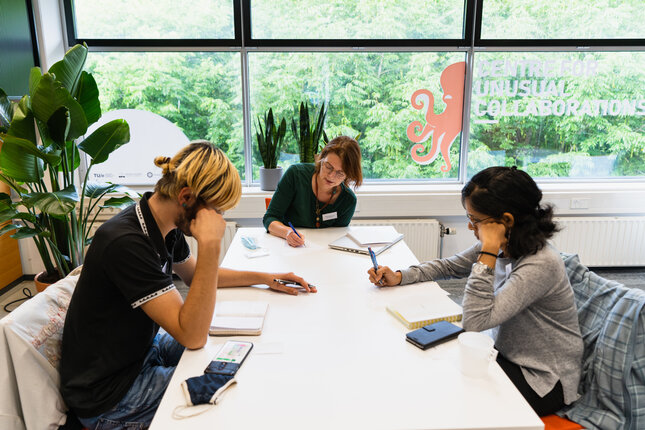
That, according to Corinne Lamain, director of CUCo, is exactly what the projects are all about: understanding problems better in order to achieve better outcomes. "If the projects produce refreshing ideas, it is already successful. Moreover, we see this form of collaboration as a positive counterpoint to the competitive nature within the scientific world.” A much needed counterpoint, Lamain explains. “The latter is really ingrained in the culture, resulting in more and more specialisms. While societal challenges today are too complex to be solved from a single perspective or discipline. That is why we focus on ways to build relationships of trust. Interdisciplinarity on its own is as old as the road to Rome, but CUCo is precisely about unexpected, not yet existing combinations of disciplines that go off the beaten path."
Space for a different way of working together
The initiative for the strategic alliance with Wageningen and Utrecht originated in 2019 among the principals of the strategic alliance institutions with the slogan 'Challenging future generations’. Then the representatives of the four 'Young Academies' of the partner institutions were given carte blanche to establish a center within this strategic alliance. They formulated two pillars: generating attention and facilitating collaboration. But Lamain mentions another goal, which is to make resources available to mid-career researchers to achieve truly alternative results. "So, not only talk the talk, but also walk the walk. Creating more space for that other way of working together, so that young researchers can more easily select to do that."
We see this form of collaboration as a positive counterpoint to the competitive nature within the scientific world
Corinne Lamain, director of CUCo
Thus, two types of grants were created: Spark and Unusual Collaborations. "The Spark Grant is intended for a group of people unfamiliar with each other, to give new ideas a run for their money: 'Do we see opportunities in starting a project together?’ It's not a huge grant that ties researchers for years, but a modest expense allowance to spend a year investigating whether a collaboration has potential. The conclusion may also be 'no'. That's pretty new, something so small and accessible." The Unusual Collaboration grants follow on from this: "A substantial fund to spend a year doing unusual research that can go in any direction. Research for which it is difficult to get a grant through other means."
During that unusual research, learning is central, Lamain emphasizes. "Failure is part of it. Successful or not, as long as learning takes place. CUCo is about gaining insights about the process, we see that as shared learning. Of course, we also encourage results, but collaboration and reflection on them is really the common denominator."
TU/e is well presented within CuCo:
| CuCo Board Members | Daniël Lakens, Daniel Tetteroo, Sandra Hofmann | |
| UCo project | All in the same boat | Yali Tang |
| Defeating Chronic Pain | Yoeri van de Burgt | |
| Fair Battery | Antoni Forner-Cuenca, Yali Tang | |
| Playing with the trouble | Dan Lockton | |
| Power of One | Daniël Lakens, Mathias Funk | |
| Data-driven dashboard | Ruud van Sloun, Fons van der Sommen | |
| SPARK projects | Better Waive than worry | Patty Stabile |
| Tackling Future Workforce challenges | Karin Smolders, Leander van der Meij | |
| Ultimate Plasticity | Natal van Riel, Loai Abdelmohsen | |
| Origami | Irina Kostitsyna | |
| Unusual Perspectives | Lenneke Kuijer, Joep Frens | |
| Imagining More than human communities | Irene Kuling |
Media contact
More on our strategy

![[Translate to English:] [Translate to English:]](https://assets.w3.tue.nl/w/fileadmin/_processed_/c/f/csm_BvOF_2024_0319_AEV_license_TUe_Dirk_van_Meer_-_CORE_1__c976e259a5.jpg)
